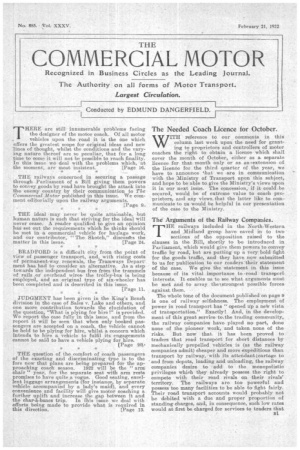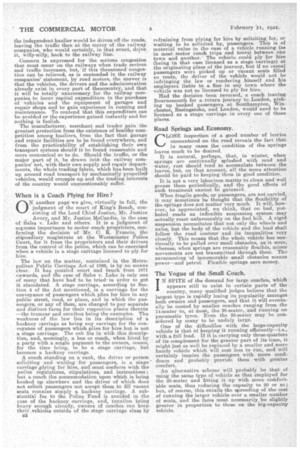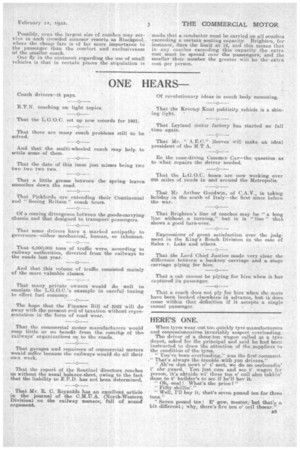The Needed Coach Licence for October.
Page 1

Page 2

Page 3

If you've noticed an error in this article please click here to report it so we can fix it.
WITH reference to our comments in this column last week upon the need for granting to proprietors and controllers of motor coaehes the right to obtain a licence which shall cover the month of October, either as a separate licence for that month only or as an *extension of the licence for the third quarter of the year, we have to announce that we -are in communication with the Ministry of Transport upon this subject, and hope -to be able to. give the Ministry's views upon it in our next issue. The concession, if it could, be secured, would be of extreme value to coach proprietors, and any views, that the latter like to communicate to is would be helpful in our presentation of the case to the Ministry.
The Arguments of the Railway Companies.
THE railways included in the North-Western and Midland group have caved in to tw'o sections of the. opposition raised to the clauses in. the Bill, shortly to be introduced in Parliament, which would give them powers to convey traffic by road, but are putting up a very bold fight for the goods traffic, and they have now submitted to us for publication to our readers 'their statement of the case. We give the statement in this issue because of its vital importance to .road transpori interests. It enables us to see what arguments must be met and to array thcstrongest possible forces against them.
The whole tone of the document published on page 9 is one of railway selfishness. The employment of power in road transport has "opened up a new vista of transportation." Exactly!, And, in the development of this great serviceto,the trading community, the railway companies have played no part, done none of the pioneer work, and taken none of the risks. But now that it has been proved to traders that road transport for short distances by mechanically propelled vehicles is (as the railway companies admit) cheaper and more expeditious than transport by railway, with its attendant.zcartage to and from depots, loading and unloading, the railway companies desire to add to the monopolistic privileges which they already possess the right to compete with their road rivals on their rivals' territory. The railways are too powerful and possess too many facilities to be able to fight fairly. Their road transport accounts would probably not be debited with a due and proper proportion of standing charges, and, in consequence, such low rates would at first be charged for service's to traders that the independent haulier would he driven off the roads, leaving the traffic then at the mercy of the railway companies, who would certainly, in. that event, drive, it, willy-nilly, back to the railway line.
Concern is expressed for the serious congestion that must occur on the railways when trade revives and traffic increases, but, if this threatened congestion can be relieved, as is contended in the railway companies' statement, by road motors, the answer is that the vehicles, the drivers and the administration already exist in every part of thetcountry, and that it will be totally unnecessary for the railway companies to incur capital expenditure in the purchase of vehicles and the equipment of garages and repair shops and to gain experience in running and maintenance. To contend that this expenditure can be avoided or the experience gained instantly and for nothing is foolish. The manufacturer, merchant and trader gain the greatest protection from the existence of healthy competition among hauliers, from the fact that garage and repair facilities are to be found everywhere, and from the practicability of establishing their own transport systems should it be found reasonable and more economical so to do. Should the traffic, or the major part of it, he drawn into the, railway companies' net, with their own supply and repair departmenta, the whole trading fabric, which has been built up around road transport by mechanically propelled vehicles, would crumple up and the trading interests Of the country would unquestionably suffer.
When is a Coach Plying for Hire ?
0 N another page we give, virtually in full, tfie judgment of the court of King's Bench, consisting of the Lord Chief Justice, Mr. Justice .., Avory, and Mr. Justice McCardiel in the case of Sales v. Lake and others. It is a judgment of supreme importance to motor coach proprietors, con firming the decision of Mr. C. K. Francis, the stipendiary magistrate at the Westminster Police Court, for it frees the proprietors and their drivers from the control of the police, which can be exercised when a vehicle is a stage carriage licensed to ply for hire, The law on the matter, contained in the Metropolitan Public Carriage .get, of 1869, is by no means clear. It has puzzled court and bench from 1871 onwards, and the case of Sales v. Lake is only one of many that have had to be tried in order to get it elucidated. A stage carriage, according to Sec tion 4 of the Act mentioned, is a carriage for the conveyance of passengers which plies for hire in any public street, road, or place, and in which the pas sengers, or any of them, are charged to pay separate and distinct fares for their respective places therein —the tramcar and omnibus being the examples. The weakness of the law lies in its description of a hackney carriage as being any carriage for the con veyance of passengers which plies for hire but is not a stage carriage. The cab fits in with this description, and, seemingly, a bus or coach, when hired by a party with a single payment to the owners, ceases, for the time being, to be a stage carriage, but becomes a hackney carriage. A coach standing on a rank, the driver or person soliciting and waiting • for passengers, is a stage ' carriage plying for hire, and must conform with the police regulations, stipulations, and instructions ; but a coach the accommodation upon which is being booked up elsewhere and the driver of which does not solicit passengers not accept them to fill vacant seats remains simply a hackney carriage. A substantial fee to the Police Fund is avoided in the case of the hackney carriage, and, taxation being heavy enough already, owners of coaches can keep. their,vehieles outside of the stage carriage class by' B2 refraining from plying for hire by soliciting for, or waiting to be solicited by, passengers. This is of material value in the ease of a vehicle running (as in most motor coach trips and tours) between one town and another. The vehicle could ply for hire (being in that case licensed as a stage carriage) at the originating place of the journey, but if no casual passengers were picked up or vacant seats filled en route, the driver of the vehicle would not be infringing the law or rendering himself and his employers liable to a fine in any town where the vehicle was not so licensed to ply for hire. Had the decision been reversed, a coach leaving Bournemouth for a return journey to London, picking up booked passengers at Southampton, Winchester, Basingstoke, and London, would need to be licensed as a stage carriage in every one of those places.
Road Springs and, Economy.
CLOSE inspection of a good number of lorries encountered on the road reveals the fact that in many cases the condition of the springs leaves much to be desired. It is natural, perhaps, that, in winter, when springs are continually splashed with mud and water, rust should tend to accumulate between the leaves, but, on that account, all the more attention should be paid to keeping them in good condition. It is not a very laborious matter to clean and well grease them periodically, and the good effects of such treatment cannot be gainsaid. When fragile goods, or passengers, are not carried, it may sometimes be thought that the flexibility of the springs does not matter very much. It will, however, be appreciated, we think, that on bad, potholed roads an inflexible suspension system may actually react unfavourably on the fuel bill. A rigid suspension necessitates that not only the, wheels and axles, but the body of the vehicle and the load shall follow the road contour and its inequalities very cleaelY. This means that the whole vehicle has continually to be pulled over small obstacles, as it were, whereas, when springs are reasonably flexible, minor movements are not transmitted through them. The surmounting of innumerable small obstacles means power—and petrol: Flexible springs save money.
The Vogue of the Small Coach.
IN SPITE of the demand for large coaches, which appears still to exist in certain parts of the country, many qualified judges believe that the largest type is rapidly losing its popularity amongst both owners and passengers, and that it will eventually be ousted by smaller coaches ranging from the 14-neater to, at most, the 28-seater, and running an pneumatic tyres. Even the 28-seater may be considered by many to be unduly large. One of the difficulties with the large-capacity vehicle is that of keeping' it running efficiently—i.e., with a full load. If it is carrying only three-quarters of its complement for the greater part of its time, it might just as well be replaced by a smaller and more handy vehicle which will cost less to run, and will certainly inspire the passengers with more confidence and probably provide them with greater comfort.
An alternative -scheme will probably he that of using the same type of vehicle as that employed for the 28-seater and fitting it up with more cothfort:able seats, thus reducing the capacity to 20 or so ; but, of course, this. entails the spreading of the cost of running the larger vehicle over a smaller number of seats, and the fares must necessarily,be slightly greater in proportion to those on the big-capacity vehicle. Possibly, even the largest size of coaches may survive in such crowded summer resorts as Blackpool,. where the cheap fare is of far snore importance to the passenger than the comfort and exclusiveness of the smaller coach.
One fly in the ointment regarding the use of small vehicles is that in certain places the stipulation is made that a conductor must be carried on all coaches exceeding a certain seating capacity. Brighton, for instance, fixesthe limit at 12, and this means that in any coaches exceeding this capacity the extra cost must be sprea,d over the passengers, and the smaller their number the greater will be the extra cost per person,






























